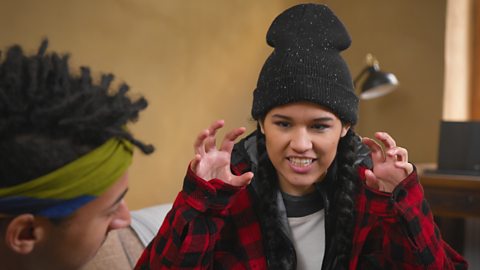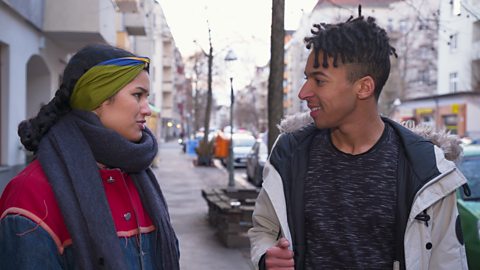Regular German verbs have standard endings. Watch this video to see how these verb endings change with the person doing the action, and how the verb needs to match up with the verb ending in order to make sense.
Makeda and Rapper are directing a music video with their friend Marco, but he struggles to understand her until she can learn how to match the verb to the person doing it.
Rapper: Halt, halt, halt. Ughh.
Makeda: He needs more attitude.
Rapper: Mmm…
Makeda: I feel like maybe he needs to sing along with the words.
Rapper: Yeah. You want to ask him if he can?
Makeda: Yeah boy! Marco, du singen?
Rapper: Um Marco, Marco, Makeda meint, singst du?
Makeda: What did you just say?
Rapper: Oh. I-I was just making sure Marco got it.
Makeda: Huh?
Rapper: In German, we kind of harmonise the person doing the thing with the verb, so they always match up. It means everyone always knows who is doing what.
Makeda: So, how does it work in German then?
Rapper: Um Marco, wir machen das nochmal, ok?
Marco: Ok.
Rapper: We add a different ending to the verb for each different type of person; so there's a different ending for I, you, he, she, it, we, the plural kind of you, and they. Um, Drüben, ja.
Makeda: And what do the endings look like?
Rapper: For ich, du, er, es, sie, it goes -e, -st, -t.
Makeda: For I, you, it he she, it goes -e, -st, -t.
Rapper: So pick an action word out of the dictionary, chop off its ending and add -st, or -t
Makeda: For ‘I’ it's an -e, for ‘you’ it's -st, ‘it’, ‘he’, ‘she’ takes a -t.
Rapper: For ‘ich’ it's an -e, for ‘du’ it's -st, ‘er’, ‘es’, ‘sie’ takes a -t.
Makeda: ‘It’, ‘he’, ‘she’ takes a -t.
Rapper: For ‘ich’ it's an -e, for ‘du’ it's -st, ‘er’, ‘es’, ‘sie’ takes a -t.
Makeda: Ich versteh-e, I understand. Marco, du sing-st jetzt!
Rapper: Das stimmt.
Makeda: Okay, let's just check what we've got so far. Uh, Marco tanzt, Marco spielt Gitarre, Marco spielt Schach, und Marco macht eine Bodenwelle, the worm.
Rapper: Um
Makeda: Okay, und jetzt! Er macht einen Spagat. Wow! Er macht einen Spagat! Ich mache auch einen Spagat!
Rapper: Woah, woah, woah. Pause, Leute, Pause. Makeda, there was one more person I can teach you, and that is 'we' - 'wir'. The ending for that is pretty simple, it's the same as the infinitive, like the way you find the word in the dictionary. I think we should do something with us all together.
Makeda: Okay, so maybe we could walk? To walk, that's an infinitive right?
Rapper: Ganz genau.
Makeda: Wir gehen. Or like, why don't we all dance together? That's ‘tanzen’, right? Wir tanzen alle zusammen!
Marco: Oder ich singe, du singst, und er singt.
Rapper: Wir singen alle zusammen? Uh, Ja, das ist eine gute Idee, Marco.
Makeda: Oder Marco spielt Gitarre und wir zwei machen einen Spagat.
Rapper: Niemals, Makeda! Um you know, someone has to manage the camera, right?
Makeda: Ahh, excuses, excuses.
Rapper: Nein, es ist die Wahrheit, it's the truth!
Makeda: Okay, okay. Ich fähre Regie, du fährst die Kamera und Marco macht den Rest!
Marco: Also, wir tanzen nicht zusammen und ich tanze alleine?
Makeda: Genau. Okay. Marco macht den Hampelmann. Marco spielt Tennis. Nein, er macht einen Kopfstand?
Marco: Immer mache ich die komplizierten Sachen. Ich versuche alles.
Makeda: Ja, du machst alles so gut! Hey! What did I do? Was habe ich gemacht?
GCSE exam dates 2025
Find out everything you need to know about the 2025 GCSE exams including dates, timetables and changes to exams to get your revision in shape.

More on Everyday language
Find out more by working through a topic
- count10 of 10

- count1 of 10

- count2 of 10

- count3 of 10
